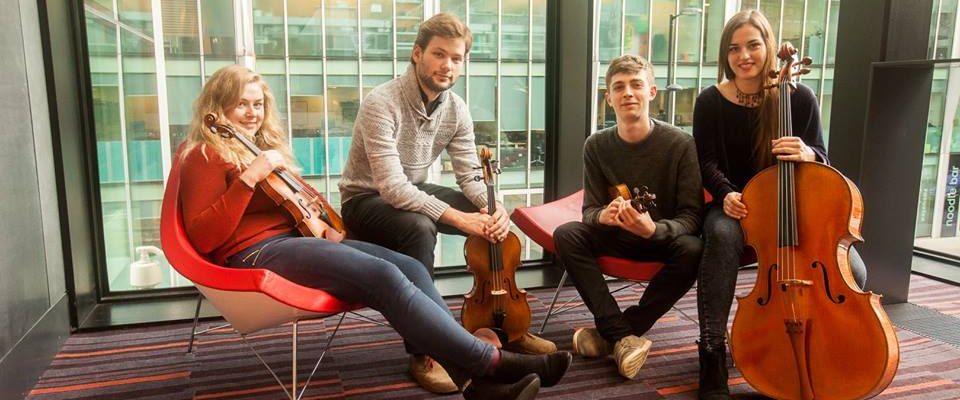Young Artist Interview: Elliot Gresty on Competing for Success
Clarinetist Elliot Gresty is the Company’s Prince’s Prize 2019 award winner, an award given to the most promising young instrumentalist or singer. Elliot also holds the 2018 Royal Over-Seas League Award for a Woodwind Player of Promise, and Musicians’ Company Award 2018. We caught up with Elliot to find out how competitions are helping to advance his music career, and whether there are any secrets to his winning success.
What’s the secret to your recent competition success?
It’s always hard to say exactly why you win a competition. For the Prince’s Prize, each contestant had to perform a 15-minute free choice programme. Trying to show your skill in such a short timeframe can be challenging but I chose a good programme. My first piece was a beautiful lyrical piece by Danish musician, Gade, that I chose to show how the clarinet can sing. I then performed Gra by Elliott Carter, a piece I absolutely love. Explaining this piece to the audience before playing it – Gra is a Polish word for ‘game’ and the music sounds like a battle between two different voices – really helped get the audience on board, and feel more involved in the performance. I even got a laugh at the end! My final piece was more classical – Premiere Rhapsodie by Debussy, which I performed from memory.
What will you spend your prize money on?
Winning prize money is always incredibly helpful in funding my Postgraduate studies – I’m in my second year at the Royal College of Music, where I did undergraduate studies too. Some of my most recent prize money will go towards my studies, the rest towards a new clarinet, possibly a bassett horn so I can play a lot more repertoire. I currently own a B flat, A, E flat and bass clarinets.
Is winning a competition as much about luck as skill?
It’s a bit of both. The repertoire is incredibly important but you can never be sure what the judges are looking for. All you can do is perform to the best of your ability and look after your audience, just as you would with any performance. It’s incredible if you do win but there are still lots of benefits to entering a competition even if you don’t.
How do you prepare for a competition?
I tend to perform pieces I’m really comfortable with and have practised a lot. I also ensure I get enough sleep the night before. I’ve started drinking orange juice before a performance as I find this stops my mouth drying out better than water.
Are competitions helpful even if you don’t win?
Win or lose, as long as I play well I always feel it’s been worthwhile. Competitions are a great way to connect with other musicians and the judges. I’ve often landed a few jobs thanks to either a judge or audience member watching me play, whether or not I’ve won the competition itself. Obviously when you do win it’s incredible. Winning the Prince’s Prize has been a massive confidence boost, encouraging me to enter more competitions and take my solo career more seriously.
What doors have competitions helped to open so far?
The performance opportunities competitions bring can be just as valuable as the prize money. I was recently invited onto Radio 3 – In Tune thanks to the Musicians’ Company PR team, where I performed the first Fantasy Piece by (Niels Wilhelm) Gade and Debussy’s Premiere Rhapsodie live. I’m also a Yeoman of the Company which all Company award winners can become. The Yeoman scheme provides free PR and performance opportunities, as well as the chance to go into schools and do outreach and workshops. Showing kids the cool things instruments can do is always fun; they’re so enthusiastic and they always find a way to brighten up your day. I’ve recently done workshops in Islington and at a school in Chessington with a bassoonist where we played some duets and got the kids to clap along. One of the pupils asked ‘Why do you bend your knees so much when you play’. No-one’s asked me that before!
What are your plans for the next year?
I’ll shortly be entering the second year of my Masters. Before that you can catch me playing Mozart on period instruments with The Hanover Band in the Arundel 2019 festival. Historic clarinets really interest me despite being so different to modern clarinets. They’re brown, have fewer keys and you have to tie the reed on with a few wraps of string! In short, they’re so flawed and out of tune you might wonder why anyone would want to play one, but they create a very different sound, and one Mozart, for instance, would’ve written his music for. I’m currently on the waiting list to have some classical clarinets made up that will enable me to do more period performances. I also have a recital in Walton on Thames in November.
You can find out more about Elliot here.
Piece by @suzywillmott





